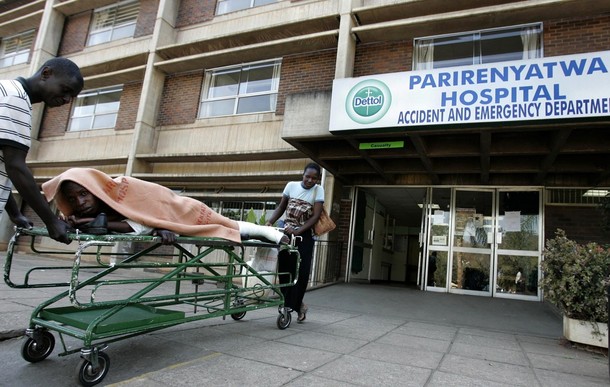


 PARALYSIS has gripped the country’s major hospitals across the country after a deadlock between the Ministry of Health and Child Care and the striking doctors that has seen the latter not returning to work. Most patients at referral hospitals such as Parirenyatwa and Harare Central Hospital in the capital are being turned away and a similar situation is unfolding at the United Bulawayo Hospital (UBH) and Mpilo Hospital in Bulawayo.
PARALYSIS has gripped the country’s major hospitals across the country after a deadlock between the Ministry of Health and Child Care and the striking doctors that has seen the latter not returning to work. Most patients at referral hospitals such as Parirenyatwa and Harare Central Hospital in the capital are being turned away and a similar situation is unfolding at the United Bulawayo Hospital (UBH) and Mpilo Hospital in Bulawayo.
At Gweru Central Hospital, Wilton Chemhuru, the provincial medical director said the institution had so far been spared from the brunt of the doctor’s strike as its core medical personnel were still reporting for duty. “Our main crop of doctors is not on strike whatsoever,” Chemhuru said. The situation is far from re-assuring elsewhere.
A notice at UBH, which is the largest referral hospital in the southern region, read: “Considering the current strike by housemen, we have seen it fit for us as middle level doctors to withdraw our services with immediate effect. This is because the same issues affecting the striking doctors affect us even more and we are aggrieved by the lack of urgency by which it is being handled.”
Only emergency cases are being attended to at public hospitals, as doctors across the country stand their ground demanding “a written commitment” from their employer for salary increases. The sparring parties have so far failed to reach an agreement. Doctors are demanding salaries of US$1 200 a month from the current US$282 and would like to see an improvement in their service conditions, which include long working hours. They also want US$10 for doctors on call up from the current measly US$0,35cents as well as insurance against the transfer of communicable diseases such as HIV/AIDS, Ebola and Tuberculosis.
A junior doctor who practised at Mpilo in 2012, but has since relocated to South Africa where he is pursuing further studies said “the strike was inevitable” as doctors in Zimbabwe have had to endure for a long time low salaries and deplorable working conditions. “That explains why there is also a high skills exodus as doctors leave Zimbabwe in search of greener pastures, where their expertise can be rewarded more handsomely,” said the Zimbabwean doctor who asked not to be named.
Lovemore Mandiziva, chief executive officer at Mpilo Hospital, confirmed to the Financial Gazette that the institution had received military doctors to help, but would not be drawn to provide further details of the numbers and how the institution was coping. “We have received military doctors, I can confirm that. But for any other queries you will need to speak to my principal director,” Mandiziva said.
Asked if the concerns of the doctors were legitimate enough to warrant them to embark on the strike, Mandiziva refused to comment and said, “I don’t want to be drawn into taking sides with any particular group in this issue.” Military doctors were deployed last week by the government as an interim measure to prevent the total collapse of the public health system.
Years of inadequate funding, staff exodus and shortage of essential medication has reduced the public health sector into a shell. The threat of an Ebola outbreak in Zimbabwe also looms large and the preparedness of the country to deal with the epidemic has come under scrutiny after a cholera outbreak in 2008 left nearly 4 000 people dead before it was contained. Observers have expressed reservations on how long military doctors will be able to cope with the high patient turnover, should the strike protract as the doctors have rejected pleas from the government that they return to work, while a solution to their demands is being met.
“We refused to return to work because we won’t be able to convince our members to go to work without any tangible formal agreement”, said Francis Rwodzi, the Zimbabwe Hospital Doctors Association public relations officer. ”Doctors will only return to work once the government offers them a written commitment to improve their welfare”.
The cash-strapped government is likely to find the demands tabled by the doctors far above its ability, as it already has to grapple with a wage bill that consumes nearly 75 percent of revenue inflows into its coffers. Any salary hikes for the doctors could trigger similar demands by other civil servants, who are unhappy with their present material positions.
Zibusiso Dube, a commentator, said the government was in a fix, as the doctors’ concerns were justified and yet the government at present could not afford astronomical increases. “…On the one hand, their concerns are justified. The salaries that they are getting are below par and the government should make concerted effort to increase them. But on the other…the strike puts monetary matters above issues of morality,” said Dube.
“Already media reports suggest that people have died because of the strike. While they are justified, the doctors should perhaps have used different means to push the government for an increase. However, in the final analysis, the buck stops with the government because that is who we can hold accountable”.
newsdesk@fingaz.co.zw